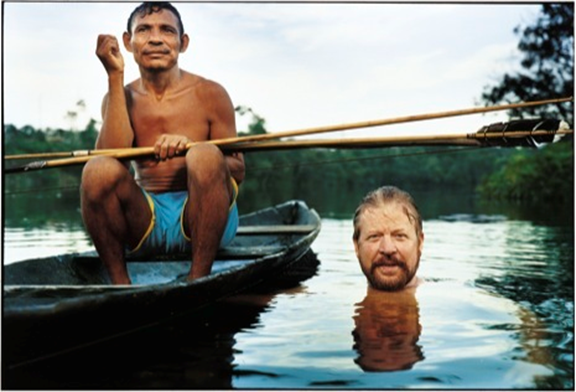
One morning last July, in the rain forest of northwestern Brazil, Dan Everett, an American linguistics professor, and I stepped from the pontoon of a Cessna floatplane onto the beach bordering the Maici River, a narrow, sharply meandering tributary of the Amazon. On the bank above us were some thirty people—short, dark-skinned men, women, and children—some clutching bows and arrows, others with infants on their hips. The people, members of a hunter-gatherer tribe called the Pirahã, responded to the sight of Everett—a solidly built man of fifty-five with a red beard and the booming voice of a former evangelical minister—with a greeting that sounded like a profusion of exotic songbirds, a melodic chattering scarcely discernible, to the uninitiated, as human speech. Unrelated to any other extant tongue, and based on just eight consonants and three vowels, Pirahã has one of the simplest sound systems known. Yet it possesses such a complex array of tones, stresses, and syllable lengths that its speakers can dispense with their vowels and consonants altogether and sing, hum, or whistle conversations. It is a language so confounding to non-natives that until Everett and his wife, Keren, arrived among the Pirahã, as Christian missionaries, in the nineteen-seventies, no outsider had succeeded in mastering it. Everett eventually abandoned Christianity, but he and Keren have spent the past thirty years, on and off, living with the tribe, and in that time they have learned Pirahã as no other Westerners have.
“Xaói hi gáísai xigíaihiabisaoaxái ti xabiíhai hiatíihi xigío hoíhi,” Everett said in the tongue’s choppy staccato, introducing me as someone who would be “staying for a short time” in the village. The men and women answered in an echoing chorus, “Xaói hi goó kaisigíaihí xapagáiso.”
Everett turned to me. “They want to know what you’re called in ‘crooked head.’ “
“Crooked head” is the tribe’s term for any language that is not Pirahã, and it is a clear pejorative. The Pirahã consider all forms of human discourse other than their own to be laughably inferior, and they are unique among Amazonian peoples in remaining monolingual. They playfully tossed my name back and forth among themselves, altering it slightly with each reiteration, until it became an unrecognizable syllable. They never uttered it again, but instead gave me a lilting Pirahã name: Kaaxáoi, that of a Pirahã man, from a village downriver, whom they thought I resembled. “That’s completely consistent with my main thesis about the tribe,” Everett told me later. “They reject everything from outside their world. They just don’t want it, and it’s been that way since the day the Brazilians first found them in this jungle in the seventeen-hundreds.”
Read more
The New Yorker, 17 April 2007.
